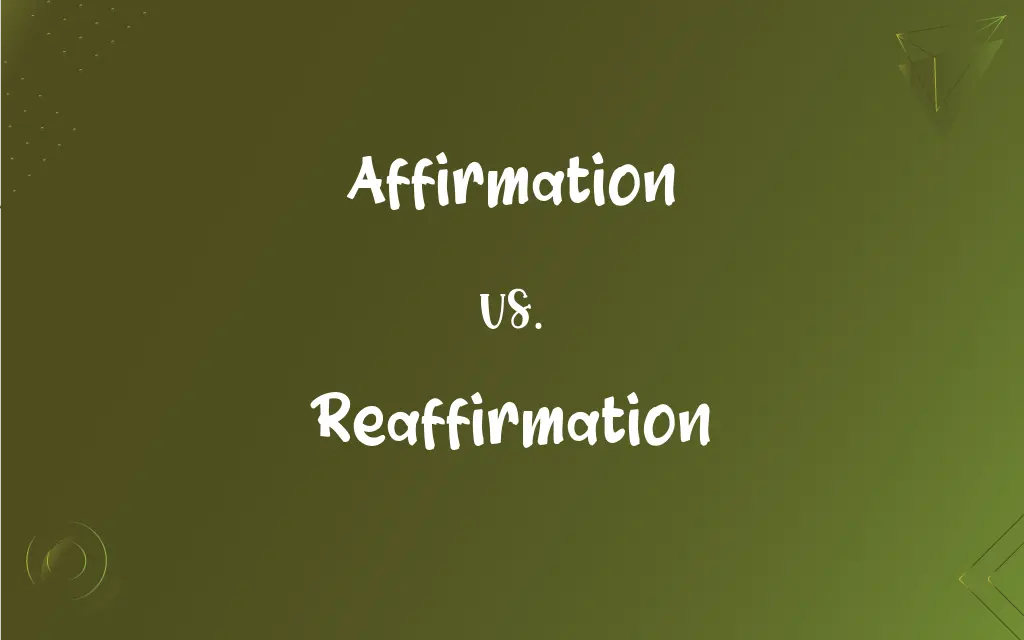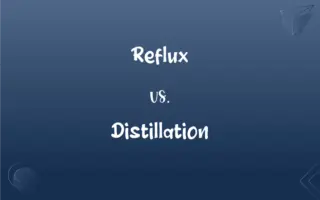Affirmation vs. Reaffirmation: What's the Difference?
Edited by Aimie Carlson || By Harlon Moss || Published on November 29, 2023
Affirmation refers to a positive assertion or support, while reaffirmation is the act of making such a declaration again or renewing it.

Key Differences
Affirmation is the act of confirming something to be true, or asserting positively. It is often used to express emotional support or to make a formal declaration. For instance, a person might use affirmation to instill confidence or to state a fact with conviction. On the other hand, reaffirmation takes place when such an assertion or support is repeated or emphasized once more. It suggests a renewal of a commitment or belief that has already been expressed. Reaffirmation typically occurs in a context where the original affirmation needs to be strengthened or renewed, perhaps due to doubts or the passage of time.
An affirmation is a statement or proposition declared to be true. It can serve various purposes, such as a statement of fact, a declaration of principles, or a manifestation of consent in a legal context. Reaffirmation, while also a statement of truth, primarily serves the purpose of emphasizing or renewing an original affirmation. For instance, a reaffirmation agreement in a legal scenario implies that a person is once again committing to the terms of a contract, often after having undergone bankruptcy proceedings.
Affirmation can also be a form of positive psychological reinforcement. It is a tool often used in self-help and motivation to foster a positive mindset. In contrast, reaffirmation in this psychological context might be employed when there's a need to re-establish one's belief in these positive statements, particularly after facing challenges or setbacks. Reaffirmation, thus, acts as a psychological boost to remind oneself of a certain positive affirmation that might have been overshadowed by recent events.
In a spiritual or religious context, an affirmation may serve as a declaration of faith or spiritual truth. It is a proclamation of one's beliefs. Reaffirmation in this realm often happens during rituals or ceremonies where individuals restate their faith or beliefs to show continued commitment. This type of reaffirmation may be an important aspect of spiritual growth or renewal.
Affirmation is a noun that embodies the action of affirming, which can be a one-time act or part of a regular practice. Reaffirmation, though similar in being a noun and related to affirming, suggests repetition and can be seen as a reiteration or reinforcement of an earlier stance. Where affirmation might be seen as the foundation of a belief or commitment, reaffirmation is the maintenance or reinforcement of that foundation.
ADVERTISEMENT
Comparison Chart
Definition
A statement of fact or belief.
Restating or reinforcing a previous statement or belief.
Usage in Speech
Often used to introduce a belief or position.
Used to reinforce, renew, or confirm a previously stated belief or position.
Psychological Role
Instills confidence or positive thinking initially.
Strengthens or restores confidence in an existing belief.
Legal Context
May signify consent or agreement initially.
Indicates a renewal of an agreement or contract.
Temporal Aspect
Can be a one-time declaration.
Implies a subsequent declaration after the first.
ADVERTISEMENT
Frequency of Use
Generally less frequent, a starting point.
More frequent, as it follows an initial affirmation.
Function in Language
Introduces or asserts information.
Emphasizes or reasserts the same information.
Affirmation and Reaffirmation Definitions
Affirmation
Positive reinforcement or support.
His kind words provided the affirmation she needed to continue.
Reaffirmation
The act of affirming something again or anew.
The CEO's speech was a reaffirmation of the company’s commitment to sustainability.
Affirmation
In spirituality, an intentional positive declaration.
Daily affirmations help him maintain a positive outlook on life.
Reaffirmation
A repeated declaration or avowal of a belief.
Her reaffirmation of love was more convincing the second time around.
Affirmation
Acceptance of a contract or agreement.
The board's affirmation of the deal ensured the company's merger.
Reaffirmation
Confirmation or ratification of a previous statement or position.
The council's vote was a reaffirmation of the original decision.
Affirmation
A declaration that something is true.
She nodded in affirmation when asked if she had witnessed the event.
Reaffirmation
In spirituality, reasserting one's faith or belief.
The ritual was a reaffirmation of their shared spiritual values.
Affirmation
A statement of fact in legal terms.
The judge asked for an affirmation of the witness’s testimony.
Reaffirmation
Legally, the renewal of a commitment to pay a debt.
Filing for the reaffirmation agreement allowed him to keep his car.
Affirmation
The act of affirming or the state of being affirmed; assertion.
Reaffirmation
To affirm or assert again.
Affirmation
Something declared to be true; a positive statement or judgment.
Reaffirmation
An act of reaffirming; a second or subsequent affirmation.
Affirmation
A statement intended to provide encouragement, emotional support, or motivation, especially when used for the purpose of autosuggestion.
Reaffirmation
Renewed affirmation
FAQs
What is an affirmation?
An affirmation is a positive assertion or declaration that something is true.
Can affirmation and reaffirmation be used interchangeably?
No, they cannot because affirmation is an initial assertion, while reaffirmation is a subsequent confirmation.
When is reaffirmation used?
Reaffirmation is used when restating or emphasizing a previously made statement or belief.
How does affirmation relate to self-help?
In self-help, affirmation is a practice of positive thinking and self-empowerment.
What is a reaffirmation?
A reaffirmation is the act of confirming or repeating an affirmation.
How does reaffirmation relate to self-help?
Reaffirmation in self-help involves reasserting positive affirmations to reinforce belief in them.
What is a legal reaffirmation?
In law, reaffirmation is an agreement to fulfill an obligation such as a debt, often after bankruptcy proceedings.
Is a reaffirmation necessary in a contract?
It can be, especially if the terms are being renegotiated or reconfirmed after an event like bankruptcy.
Do affirmations need to be followed by reaffirmations?
Not necessarily, but reaffirmations can strengthen the resolve or belief in the initial affirmation.
When is affirmation used?
Affirmation is used when stating a fact, offering support, or making a declaration for the first time.
What is a legal affirmation?
A legal affirmation is a solemn declaration that serves the same purpose as an oath.
How do affirmations impact mindset?
Affirmations can positively impact mindset by fostering a positive and proactive attitude.
Can affirmations be part of daily routines?
Yes, many people incorporate affirmations into their daily routines for personal growth.
Are reaffirmations common in religious practices?
Yes, many religious practices involve reaffirming faith or commitment regularly.
Can affirmations change one's beliefs?
They have the potential to reshape or reinforce beliefs over time.
Are reaffirmations a sign of doubt?
Not necessarily; they often serve to reinforce certainty rather than reflect doubt.
Can both affirmations and reaffirmations be verbal?
Yes, both can be expressed verbally, in writing, or through actions.
Can an affirmation become a reaffirmation?
Yes, when an initial affirmation is repeated, it becomes a reaffirmation.
Is an affirmation always positive?
Affirmations are typically positive, but they can be neutral, depending on the context.
How do reaffirmations impact mindset?
Reaffirmations reinforce and strengthen an existing positive mindset.
About Author
Written by
Harlon MossHarlon is a seasoned quality moderator and accomplished content writer for Difference Wiki. An alumnus of the prestigious University of California, he earned his degree in Computer Science. Leveraging his academic background, Harlon brings a meticulous and informed perspective to his work, ensuring content accuracy and excellence.
Edited by
Aimie CarlsonAimie Carlson, holding a master's degree in English literature, is a fervent English language enthusiast. She lends her writing talents to Difference Wiki, a prominent website that specializes in comparisons, offering readers insightful analyses that both captivate and inform.






































































